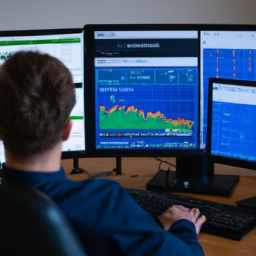In recent years, the financial technology (fintech) industry has revolutionized the way we think about investing. With the rise of automated investing, investors no longer have to rely on traditional brokers or spend hours researching the stock market. Instead, they can turn to robo-advisors and other automated portfolio managers to help them make informed investment decisions.
Robo-advisors, for example, may be suitable for new investors with little stock market experience. These automated portfolio managers are a low-cost alternative to traditional advisors and use algorithms to analyze investors' risk tolerance and investment goals before recommending a portfolio of diversified investments. This process is completely automated, meaning investors can set up their portfolios and let the robo-advisor handle the rest.
In addition to robo-advisors, fintech companies offer a variety of other automated investment services. Mobile banking, for instance, allows investors to manage their accounts and make trades on-the-go. Peer-to-peer lending platforms connect investors with borrowers, providing a low-cost alternative to traditional loans. And spare change investment apps allow investors to invest their loose change in diversified portfolios.
One of the biggest benefits of automated investing is the ability to reduce costs. Traditional brokers may charge high fees for their services, but robo-advisors and other automated portfolio managers typically charge lower fees. This makes it easier for investors to keep more of their money invested in the market, which can lead to higher returns over time.
But cost isn't the only benefit of automated investing. By using algorithms to analyze data and make investment decisions, robo-advisors and other automated portfolio managers can provide investors with a level of objectivity that may be difficult to achieve with a human advisor. This can lead to more consistent returns and a more disciplined investment strategy.
Of course, there are some downsides to automated investing as well. For example, investors may miss out on the personal touch that comes with working with a human advisor. And while robo-advisors and other automated portfolio managers may be able to provide consistent returns, they may not be able to outperform the market or adjust to changing market conditions as quickly as a human advisor might.
Despite these drawbacks, the popularity of automated investing continues to grow. In fact, robo-advisors have soared in popularity over the last decade, with the automated investing advisors quickly growing assets under management. According to a report by Statista, assets under management by robo-advisors are expected to reach $1.2 trillion by 2024.
Automated trading is another area where fintech is making a big impact. Automated trading helps investors manage their risk and reduce their reliance on tedious manual trading processes. By using algorithms to analyze market data, automate trades, and manage risk, investors can take emotion out of the equation and make more informed investment decisions.
Tax-loss harvesting is another area where robo-advisors are making a big impact. Robo-advisers that offer tax-loss harvesting identify losers in the portfolio as well as appropriate replacement investments, and handle the sale and purchase of those investments automatically. This can help investors reduce their tax liability, leading to higher returns over time.
The use of automation isn't limited to the financial industry, either. “Forward-thinking companies are investing in robotics and automation in the distribution center to accommodate growing order volumes," says a report by Supply Chain Management Review. GreyOrange Inc., for example, is a global leader in automated robotic fulfillment and provides the needed resources for intelligently investing in automation.
In conclusion, the rise of automated investing is changing the way we think about investing. With the help of robo-advisors, automated trading, and other fintech services, investors can make more informed investment decisions with lower costs and more consistent returns. While there are some downsides to automated investing, the benefits are clear, and the trend towards automation is likely to continue in the years to come.
